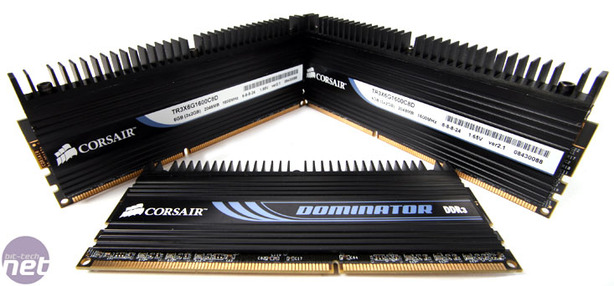Core i7 Memory Performance Conclusions
Intel has made a system that for the most part alleviates the need for more memory bandwidth. Three channels of DDR3 means we're saturated with it from the word go, and for the most part spending big money on faster performance memory has a unnoticeable effect.For games, it does nothing in the real world because the bottleneck is firmly elsewhere: either the threading capability of the game, the clock frequency of your CPU (not the Uncore) or the graphics subsystem. For other things, we're still limited for stuff like IO and storage bandwidth - so while people complain about memory use, having programs use up a big chunk of 6GB (or more) benefits performance because we're not limited by measly hard drives.
In the one important scenario - multi-tasking - the performance benefits are more considerable, so if you're heavily into running many things at once (partly what the Core i7-X58 combination was designed for) then there is likely a performance benefit in store for you.
Basically, we feel the best advice is don't go crazy because the benefits in the real world are generally not there and are better spent elsewhere. Buy memory that supports your CPU overclocking: but even if you run a base clock of 200MHz on a 6x multiplier from a Core i7 920, the memory can run at 1,200MHz so you don't need the full 1,600MHz.
For the most part, increasing the CPU Uncore frequency that includes the memory controller will give a considerable jump in performance, just like performance memory alone will - the difference is, CPU Uncore frequency is effectively free. A Core i7 920 CPU will run this at 2.13GHz at stock, but increasing its base clock to 180-200MHz will increase it to between 2.88GHz and 3.20GHz, which we've seen demonstrate a performance improvement as well.
Only those looking for records will want those extra half frames per seconds and second or two in benchmarks, meaning every ounce of frequency and timing in a system is important, but this obviously isn't limited to Core i7. While the occasional willy waggling 3DMark might be entertaining, it's not how most of us spend the day using our PCs.
Corsair Memory Value
At the time of writing, £194 and in stock this Corsair 6GB 1,600MHz C8 DHX+ kit is very good value compared to the rest of the market. After searching other UK stores, the closest match in performance and value we could find were some OCZ parts of similar spec, but that kit is 6x1GB, not the more optimal 3x2GB.
Other directly related kits from competitors are generally more expensive, like G.Skill and Patriot although there is some good value in low latency 1,333MHz kits like these two from OCZ for just £167 or £172, depending whether you like black or silver heatspreaders and paying a few quid more for some XMP profiles.
Essentially, for the improved design (compared to just plain heatspreaders), capability and price - we think Corsair has hit just the right groove here.
Final Thoughts
The Corsair TR3X6G1600C8D Dominator modules with the new DHX+ heatspreaders are good looking, potentially moddable - which is a first and something we naturally love - and hit a good price, while also being backed with the usual awesome (industry standard) lifetime warranty. There's very little wrong with them and if you are absolutely dead set on buying performance DIMMs, we have to recommend this Corsair TR3X6G1600C8D memory because it's considerably cheaper than the ultra premium 1,800MHz+ stuff and better value than everything else in its range right now.Having used it in every X58 board we've reviewed to date (and more which we haven't finished with yet) we've never had a problem with them. The overclocking headroom is quite limited, especially compared to the 4GB 1,600MHz C9 DDR3 kit we found did 1,900MHz+ with older Core 2, but DHX+ brings back the much needed special to Corsair's Dominator memory line.
However, we must reference our opinion above and state that probably the best punt for pound is the slightly slower, and cheaper 1,333MHz low latency kits above that will save a few bob and deliver most of the performance of these Corsair DIMMs. Instead, put that £20/30/40 to use in other more important areas like CPU cooling, hard drive performance or graphics - once you've done that, the cumulative benefit of these modules will be more profound.
Corsair TR3X6G1600C8D
- Performance
- x
- x
- x
- x
- x
- x
- x
- x
- -
- -
- 8/10
- Features
- x
- x
- x
- x
- x
- x
- x
- x
- x
- -
- 9/10
- Value
- x
- x
- x
- x
- x
- x
- x
- x
- -
- -
- 8/10
- Overall
- x
- x
- x
- x
- x
- x
- x
- x
- -
- -
- 8/10

MSI MPG Velox 100R Chassis Review
October 14 2021 | 15:04









Want to comment? Please log in.